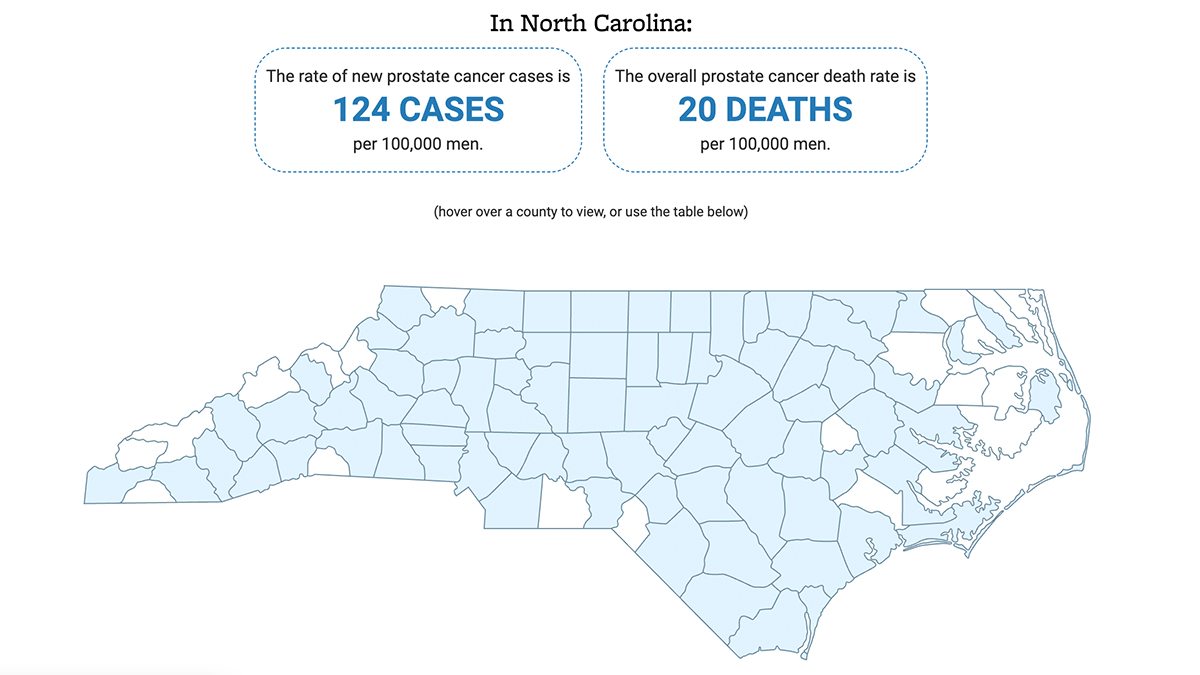Interactive map raises awareness of prostate cancer
County by county, the online tool shows disparities related to the second deadliest cancer for North Carolina men.

The UNC Men’s Health Program and Carolina Demography have launched an interactive web-based tool aimed at raising awareness and addressing disparities related to prostate cancer in North Carolina.
“Prostate Cancer Across North Carolina” provides a detailed, county-by-county map view of prostate cancer cases and deaths, offering valuable insights for local and state organizations as well as the public. The map helps users access downloadable county-specific prostate cancer reports using the latest data (currently from 2016-2020) from the National Cancer Institute’s State Cancer Profiles.
The data show the following disparities related to prostate cancer:
- North Carolina ranks 11th in the nation for new prostate cancer cases and 20th for deaths, making it the second leading cause of cancer death for men in the state, behind only lung cancer.
- Statewide, Black men are 1.7 times more likely to be diagnosed with prostate cancer and are 2.3 times more likely to die from prostate cancer compared to white men. Native American men face similar disparities.
- Anson, Edgecombe and Halifax counties report the highest number of new cases, while Graham, Gates and Wilkes counties report the lowest.
A call to action
The UNC Men’s Health Program, housed at the UNC School of Medicine, and Carolina Demography, housed at the Carolina Population Center at the UNC Gillings School of Global Public Health, envision this tool as a catalyst for positive change. They urge local and state organizations and the public to advocate for enhanced access to screenings, monitoring and appropriate treatments.
Early detection remains pivotal to improve survival rates, with five-year survival rates near 100% when the cancer remains localized to the prostate, compared to 34% for cases diagnosed after cancer spreads to other parts of the body.
New and improved diagnostic tools and technologies that have become available in the past several years now make it easier to detect the disease in the early stages, so screening is more accurate than ever.
Many factors contribute to disparities in prostate cancer diagnosis and treatment in North Carolina. Men tend to downplay the importance of screening and interventions for many health concerns. The distance from healthcare providers in rural areas and the affordability of care can hinder regular preventative health appointments, contributing to alarming disparities in our communities.
Black men are particularly affected, facing not only a higher risk of prostate cancer but also diabetes and cardiovascular disease. Currently, Black men are more than twice as likely to be diagnosed than men of other racial and ethnic groups — the largest disparity for any major cancer in men or women. These issues affect individuals and their families.
Interactive community events
In September 2023, the UNC Men’s Health Program hosted “Men, Know Your Numbers” in Wilson, North Carolina, to raise awareness and screen men for common health issues. Highlights from the event included:
- A distinguished panel with basketball legend Phil Ford, community advocates Victor Taylor and Dennis Williams, and insights from Dr. Eric Wallen, professor of urology at the medical school and member of the UNC Lineberger Comprehensive Cancer Center.
- Free blood draws onsite, assessing crucial health metrics.
- Educational materials from the Prostate Health Education Network.
The next screening event is scheduled for Feb. 10 at the Jasper G. Hayes Omega Center in New Bern, North Carolina.
Coming soon: Men’s Health Report Card
Beyond the new “Prostate Cancer Across North Carolina” tool, the Men’s Health Program is collaborating with Carolina Demography to create a “Men’s Health Report Card,” a comprehensive health and demographic report complementing the existing Women’s Health Report Card from the Center for Women’s Health Research at Carolina.
The Men’s Health Report Card is expected to be available in early 2024.







